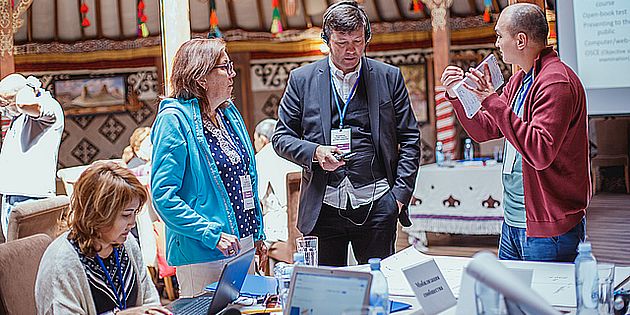Hospitable Almaty meets guests again – this time, with an educational aim. Thirty two participants, representatives of CSOs from Tajikistan, Azerbaijan, Kyrgyzstan and Kazakhstan, have arrived in Almaty in order to learn how to develop online courses for civil society organizations.
“Our concept originally included the engagement of experienced trainers. The training participants will learn best international practices from one of the best online courses developers, a teacher from Uppsala University, Geir Gunnlaugsson. The course themes were not selected randomly. They are exactly what our course participants, employees of civil society organizations, deal with,” underlined the Director of the “Partnership for Innovations” Program Kaisha Atakhanova during the opening of the Summer School.
 One of the Summer School moderators, expert and trainer Tatyana Sedova, facilitated introductions in order for participants from different countries to get acquainted with each other quickly. She used a special game for the purpose called ‘The Celtic Wheel’. The game is based on dividing people by compass points: people of the North, East, West and South. People of the North are characterized by actions: they act, without looking back at means. People of the West are characterized by discipline and an analytical mind. Oriental people (East) are characterized by creative personalities: lots of ideas, but they are not always implemented. For people of the South, the main thing is not an achievement, but the atmosphere, and relationship between people. According to the legend of ancient Celts, to achieve harmony, in every group and in every person all points of the compass should be present, even if one of them is prevailing. Here lies the essence of the closed Celtic wheel. This game helped the Summer School participants to find like-minded people.
One of the Summer School moderators, expert and trainer Tatyana Sedova, facilitated introductions in order for participants from different countries to get acquainted with each other quickly. She used a special game for the purpose called ‘The Celtic Wheel’. The game is based on dividing people by compass points: people of the North, East, West and South. People of the North are characterized by actions: they act, without looking back at means. People of the West are characterized by discipline and an analytical mind. Oriental people (East) are characterized by creative personalities: lots of ideas, but they are not always implemented. For people of the South, the main thing is not an achievement, but the atmosphere, and relationship between people. According to the legend of ancient Celts, to achieve harmony, in every group and in every person all points of the compass should be present, even if one of them is prevailing. Here lies the essence of the closed Celtic wheel. This game helped the Summer School participants to find like-minded people.

 Geir Gunnlaugsson, a developer of educational resources in the Academic Teaching and Learning Department at Uppsala University in Sweden, was an undisputed favorite during the study period. Currently, he is working as a consultant, course coordinator and international trainer on training teachers. He specializes in principles of educational program development, using IT tools and resources to improve teaching and learning, as well as various methodologies to deliver training material.
Geir Gunnlaugsson, a developer of educational resources in the Academic Teaching and Learning Department at Uppsala University in Sweden, was an undisputed favorite during the study period. Currently, he is working as a consultant, course coordinator and international trainer on training teachers. He specializes in principles of educational program development, using IT tools and resources to improve teaching and learning, as well as various methodologies to deliver training material.
“You shouldn’t think that distance education stands down traditional campus education. Here the requirements are at the same high level. It is very important that your material is accessible, and that you have an interactive environment. You should get your students involved, and to do so, it’s necessary to study their needs and learn how to motivate them,” shared Mr. Gunnlaugsson.
 Before developing any course, an author should ask himself an important question: “Who am I developing it for, and for what purpose?” This knowledge of one’s own audience and understanding of the ultimate result will help to avoid many errors.
Before developing any course, an author should ask himself an important question: “Who am I developing it for, and for what purpose?” This knowledge of one’s own audience and understanding of the ultimate result will help to avoid many errors.
“As a matter of fact, everyone makes errors but I would like to help you avoid many mistakes that we have made. I would like to help you create good quality educational material and develop genuinely effective online courses,” stated Mr. Gunnlaugsson.
Over the course of four days, the Summer School participants will not only learn about international practices, but will develop an author’s course.
“We will prepare courses for 4 levels: basic, advanced, premium and master’s degree courses. An outcome of this Summer School will be drafts, or working versions of your courses. In the coming 2 to 3 months they will be finalized, and in October we already plan to launch a pilot course,” explained Kaisha Atakhanova.
This summer school is by no means the last one. In November, ARGO plans to open registration for new courses for a winter school session. Over the entire period of training, the Web Academy staff will provide help to trainers in developing courses that will then be launched on the new educational platform. 


